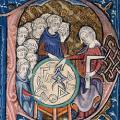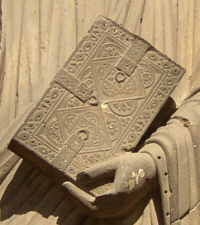225. No Uncertain Terms: Thirteenth Century Logic
The terminist logicians William of Sherwood and Peter of Spain classify the various ways that language can relate to the world.
Thanks to Catarina Dutilh Novaes for help with this episode.
Themes:
• John of Salisbury, The Metalogicon. A Twelfth-Century Defense of the Verbal and Logical Arts of the Trivium, trans. D.D. McGarry (Philadelphia: 2009).
• Lambert of Auxerre, Logica, trans. T.S. Maloney (Notre Dame: 2015).
• Peter of Spain, Language in Dispute, trans. F.P. Dineen (Amsterdam: 1990).
• William of Sherwood, Introduction to Logic, trans. N. Kretzmann (Minneapolis: 1966).
• E.J. Ashworth, “Terminist logic,” in R. Pasnau (ed.), The Cambridge History of Medieval Philosophy, 2 vols (Cambridge: 2010), vol.1, 146-58.
• A. Broadie, Introduction to Medieval Logic (Oxford: 1993).
• L.M. de Rijk, Logica Modernorum, 2 vols (Assen: 1967).
• D.M. Gabbay and J. Woods (eds), Handbook of the History of Logic, vol.2: Mediaeval and Renaissance Logic (Amsterdam: 2008).
• N. Kretzmann, A. Kenny and J. Pinborg (eds), The Cambridge History of Later Medieval Philosophy (Cambridge: 1982) [includes numerous articles on 13th-14th century logic].
• A.M. Mora-Márquez, "Thirteenth-Century Aristotelian Logic: the Study of Scientific Method," Oxford Studies in Medieval Philosophy 9 (2021), 149-86.
• J. Spruyt, “Thirteenth-Century Discussions on Modal Terms,” Vivarium 32 (1994), 196-226.
• J. Spruyt and C. Dutilh Novaes, “Those ‘Funny Words’: Medieval Theories of Syncategorematic Terms,” in M. Cameron and R.J. Stainton (eds), Linguistic Content: New Essays on the History of Philosophy of Language (Oxford: 2015), 100-20.
Stanford Encyclopedia: Properties of Terms in Medieval Philosophy






Comments
Peter, it is always a
Peter, it is always a pleasure to listen to the episodes of your podcast. And thank you for another episode in this week. By the way, I noticed that the music has changed in this episode. Could you tell me about it?
In reply to Peter, it is always a by Namjoong Kim
New music
Oh right, this is the new music for the 13th century. It is a Gregorian Chant called "Veni Creator Spiritus." This version is available for free here.
RE: Bill Clinton & Thirteenth Century Logic
Peter,
Thought your references to Bill Clinton were both entertaining and relevent to the topic of Scholastic disputation and logic
It is interesting that Clinton started his educational life at St. John Catholic elementary school in Hot Springs, AR. One wonders what beginning forms of disputation he gained there. Can't help but feel that this, and his interest in law by the time of high school--and then attending a famous Catholic (and Jesuit) university, Georgetown, as an undergrad, must be an influnece on his handling of his impeachment struggles, esp. his testifying to the Office of Independent Council--even if I can't take seriously that he was using such potentially metaphysical and linguistic questions extending back to Plato as to "what the meaning of 'is' is" for anything enlightening philosophical. But a master of disputation? For sure.
Rhys William Roark
OKC, OK
In reply to RE: Bill Clinton & Thirteenth Century Logic by Rhys William Roark
The "Barbara" part was really
The "Barbara" part was really fun!
In reply to The "Barbara" part was really by Namjoong Kim
Barbara
The Clinton references were definitely a low blow!
In reply to Barbara by Haseef
Clinton
Well, bear in mind that the story of the Clinton clan was less tragic (for them and the nation/world/cosmos) when I wrote the episode!
medieval philosophy
Thank you, Peter-- I have been following your podcast for many months now and find it one of the richest and most absorbing philosophy sites on the Net. Your passion for your subject is truly infectious. You deserve the thanks of so many....I look forward especially to the episode (s) on Duns Scotus.
In reply to medieval philosophy by Tom Pirkle
Thanks
Thanks so much! That's very encouraging. I am looking forward to Scotus too, I actually regard him as the most interesting philosopher of the 13th century, ahead of Aquinas even. But it's a real all-star lineup once we hit the second half of the century.
What factors helped the the proliferation of philosophy
Hello,
Not exactly sure where to ask this (general question for the this era). While I've been listening to the Medieval podcasts, I've been wondering what technological and social factors help philosophy flourish during this time. Realize it is a broad question, but is there a good source for this? For example, were there advances in technology for writing materials that led to a lot more supply of access to scholars of the time? I suppose with the Crusades there was a lot more travel within Europe with less in-fighting? Thus scholars could more easily travel and share ideas? Was there a burgeoning of vellum/parchment/paper to go around? :)
In short, why this time? And specifically, what advances in technology helped its proliferation.
Thank you for the great podcasts and any help!
In reply to What factors helped the the proliferation of philosophy by Esherman
Medieval social factors
That is an excellent question, though of course not easy to answer. I think part of the explanation is urbanization, linked to the flourishing of markets in towns and cities: this is often linked to the rise of the universities which of course are the most important social context for philosophy. More generally the establishment of institutional frameworks like chanceries and scriptoria where the church supported writing and copying of texts meant that books of all kinds were easier to find and there was a higher (though still low) rate of literacy. I would suggest that medieval philosophy probably expands as a kind of free rider on the real social development, which is the explosion of learned activity around law and theology.
I guess by the way it wouldn't be the use of paper since medieval philosophy flourishes in Western Europe before paper technology arrives, though once paper did come in that helped too obviously.
In reply to Medieval social factors by Peter Adamson
Thank you much for the reply
Thank you much for the reply and info. Good information and something to look into.
Add new comment